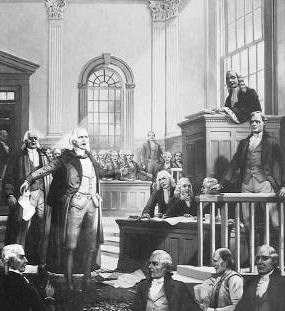LAD/Blog #31: Schenck v. United States
LAD/Blog #31: Schenck v. United States
Schenck V. United States is the court case addressing the actions of Charles Schenck and Elizabeth Baer. They distributed leaflets against the draft, which said that it violated the Thirteenth Amendment. Schenck was charged with violating the Espionage Act of 1917 for “attempting to cause insubordination and to obstruct recruitment.” They were convicted and appealed that the law violated the First Amendment. The court maintained that the First Amendment wasn’t violated and that the Espionage Act was appropriate in wartime. Justice Oliver Wendell Holmes said that courts had to defer to the government during wartime, and he also said that Schenck's letters posed a "clear and present danger," as they were hurting the nation, and had to be stopped. Finally, Holmes compared Schenk's distribution of letters to shouting "Fire!" in a crowded theater: it only caused harm/alarm, and were not permitted under the First Amendment.

Schenck v. United States

Peter Zenger trial (synthesis):
The Peter Zenger trial was similar to Schenck v. US because both involved court cases where individuals were speaking out against the government/authority, and were cracked down upon.
Schenck V. United States is the court case addressing the actions of Charles Schenck and Elizabeth Baer. They distributed leaflets against the draft, which said that it violated the Thirteenth Amendment. Schenck was charged with violating the Espionage Act of 1917 for “attempting to cause insubordination and to obstruct recruitment.” They were convicted and appealed that the law violated the First Amendment. The court maintained that the First Amendment wasn’t violated and that the Espionage Act was appropriate in wartime. Justice Oliver Wendell Holmes said that courts had to defer to the government during wartime, and he also said that Schenck's letters posed a "clear and present danger," as they were hurting the nation, and had to be stopped. Finally, Holmes compared Schenk's distribution of letters to shouting "Fire!" in a crowded theater: it only caused harm/alarm, and were not permitted under the First Amendment.

Schenck v. United States

Peter Zenger trial (synthesis):
The Peter Zenger trial was similar to Schenck v. US because both involved court cases where individuals were speaking out against the government/authority, and were cracked down upon.
Comments
Post a Comment